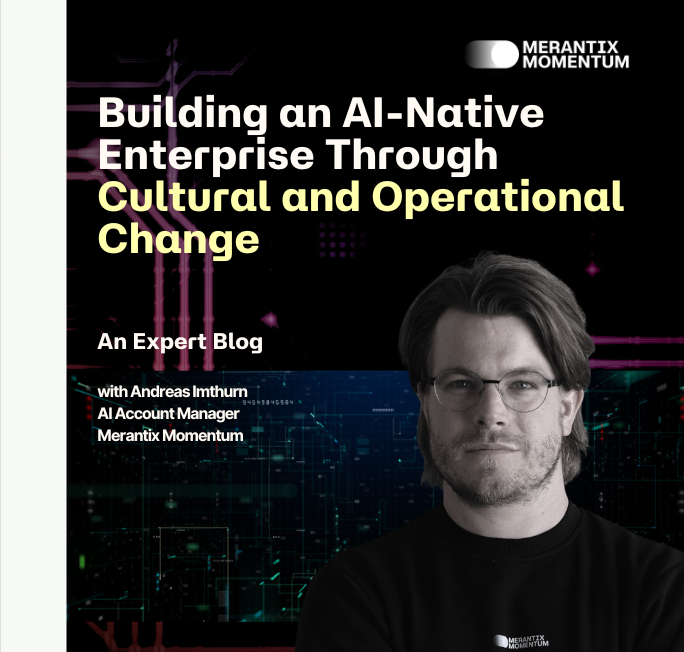From bottleneck to breakthrough: Why AI is crucial for progress in healthcare and pharma

The healthcare and pharmaceutical sector is at a turning point. We are experiencing rising costs, a persistent shortage of specialists, increasingly complex patient needs - and a flood of data that no human team can fully manage. At the same time, expectations for better, faster and more personalized care are higher than ever.
For real progress, we need more than small improvements. We need tools that scale expertise, automate routines and free up scarce capacities. This is where AI comes in - not as a buzzword, but as a fundamental technology to reshape care, research and the market launch of therapies.
The case for AI: solving the industry's major challenges
AI can - if used precisely and responsibly - create measurable added value in three core areas:
- Supplementing clinical workflows
Doctors spend too much time in front of screens instead of with patients. AI-supported documentation assistants can reduce the administrative burden by up to 70%, freeing up more time for diagnosis, treatment and human care. In addition, diagnostic AI systems based on imaging or multimodal data support faster and more accurate findings - they do not replace doctors, but strengthen their clinical judgment. - Accelerating drug development
The development of a drug often takes over a decade and costs billions. AI will not shorten this per se, but given the "low hanging fruits" harvested, more is needed to bring innovations to patients. AI can help close this gap and avoid rising costs due to increasing complexity. Models can be used to identify molecular interactions and targets more quickly. Natural language models search millions of scientific publications and help generate testable hypotheses. Study site selection, patient recruitment and monitoring can all be improved with AI-optimized workflows. - Creating value from data on a large scale
Organizations in the healthcare and pharmaceutical industries generate enormous amounts of unstructured data - notes, images, omics data, medical device data. Most of it is currently barely used or only used once and rarely in combination. AI, especially multimodal AI, can transform this data into actionable insights. From personalized treatment recommendations to population-level predictions, we are finally building the computational tools to make data serve the system.
The strategic imperative
The question is no longer whether AI will become part of healthcare and pharma. The question is: who will use it responsibly, effectively and on a large scale?
AI is a strategic lever. It enables managers:
- Achieving more with fewer resources
- Act faster without losing quality
- Remaining competitive in an environment increasingly characterized by data and intelligence
However, technology alone is not enough. Success requires in-depth expertise, regulatory sensitivity and systems that are built for practical use - not just academic feasibility studies.
Human + machine: the new standard for progress
AI in this area does not replace doctors, nurses or researchers. It equips them with superpowers: Recognizing patterns that previously remained hidden, making decisions with more certainty, with an AI by their side to review decisions, or simply a helping hand that reduces paperwork and creates more time for human, empathetic and ethical care.
This is the future we are shaping at Merantix Momentum: human-centered AI that accelerates progress in healthcare and pharma in a responsible and practical way.
If you would like to shape this change and explore how AI can create real impact in your organization, please contact me.
Let's move from bottleneck to breakthrough together.
Bertram Weiss
VP Health, Merantix Momentum
📧 bertram.weiss@merantix-momentum.com
Connect on LinkedIn
Subscribe to the Merantix Momentum Newsletter now.
More articles
From bottleneck to breakthrough: Why AI is crucial for progress in healthcare and pharma
The healthcare and pharmaceutical sector is at a turning point. We are experiencing rising costs, a persistent shortage of specialists, increasingly complex patient needs - and a flood of data that no human team can fully manage. At the same time, expectations for better, faster and more personalized care are higher than ever.
For real progress, we need more than small improvements. We need tools that scale expertise, automate routines and free up scarce capacities. This is where AI comes in - not as a buzzword, but as a fundamental technology to reshape care, research and the market launch of therapies.
The case for AI: solving the industry's major challenges
AI can - if used precisely and responsibly - create measurable added value in three core areas:
- Supplementing clinical workflows
Doctors spend too much time in front of screens instead of with patients. AI-supported documentation assistants can reduce the administrative burden by up to 70%, freeing up more time for diagnosis, treatment and human care. In addition, diagnostic AI systems based on imaging or multimodal data support faster and more accurate findings - they do not replace doctors, but strengthen their clinical judgment. - Accelerating drug development
The development of a drug often takes over a decade and costs billions. AI will not shorten this per se, but given the "low hanging fruits" harvested, more is needed to bring innovations to patients. AI can help close this gap and avoid rising costs due to increasing complexity. Models can be used to identify molecular interactions and targets more quickly. Natural language models search millions of scientific publications and help generate testable hypotheses. Study site selection, patient recruitment and monitoring can all be improved with AI-optimized workflows. - Creating value from data on a large scale
Organizations in the healthcare and pharmaceutical industries generate enormous amounts of unstructured data - notes, images, omics data, medical device data. Most of it is currently barely used or only used once and rarely in combination. AI, especially multimodal AI, can transform this data into actionable insights. From personalized treatment recommendations to population-level predictions, we are finally building the computational tools to make data serve the system.
The strategic imperative
The question is no longer whether AI will become part of healthcare and pharma. The question is: who will use it responsibly, effectively and on a large scale?
AI is a strategic lever. It enables managers:
- Achieving more with fewer resources
- Act faster without losing quality
- Remaining competitive in an environment increasingly characterized by data and intelligence
However, technology alone is not enough. Success requires in-depth expertise, regulatory sensitivity and systems that are built for practical use - not just academic feasibility studies.
Human + machine: the new standard for progress
AI in this area does not replace doctors, nurses or researchers. It equips them with superpowers: Recognizing patterns that previously remained hidden, making decisions with more certainty, with an AI by their side to review decisions, or simply a helping hand that reduces paperwork and creates more time for human, empathetic and ethical care.
This is the future we are shaping at Merantix Momentum: human-centered AI that accelerates progress in healthcare and pharma in a responsible and practical way.
If you would like to shape this change and explore how AI can create real impact in your organization, please contact me.
Let's move from bottleneck to breakthrough together.
Bertram Weiss
VP Health, Merantix Momentum
📧 bertram.weiss@merantix-momentum.com
Connect on LinkedIn


.png)
.png)

.png)
.png)
